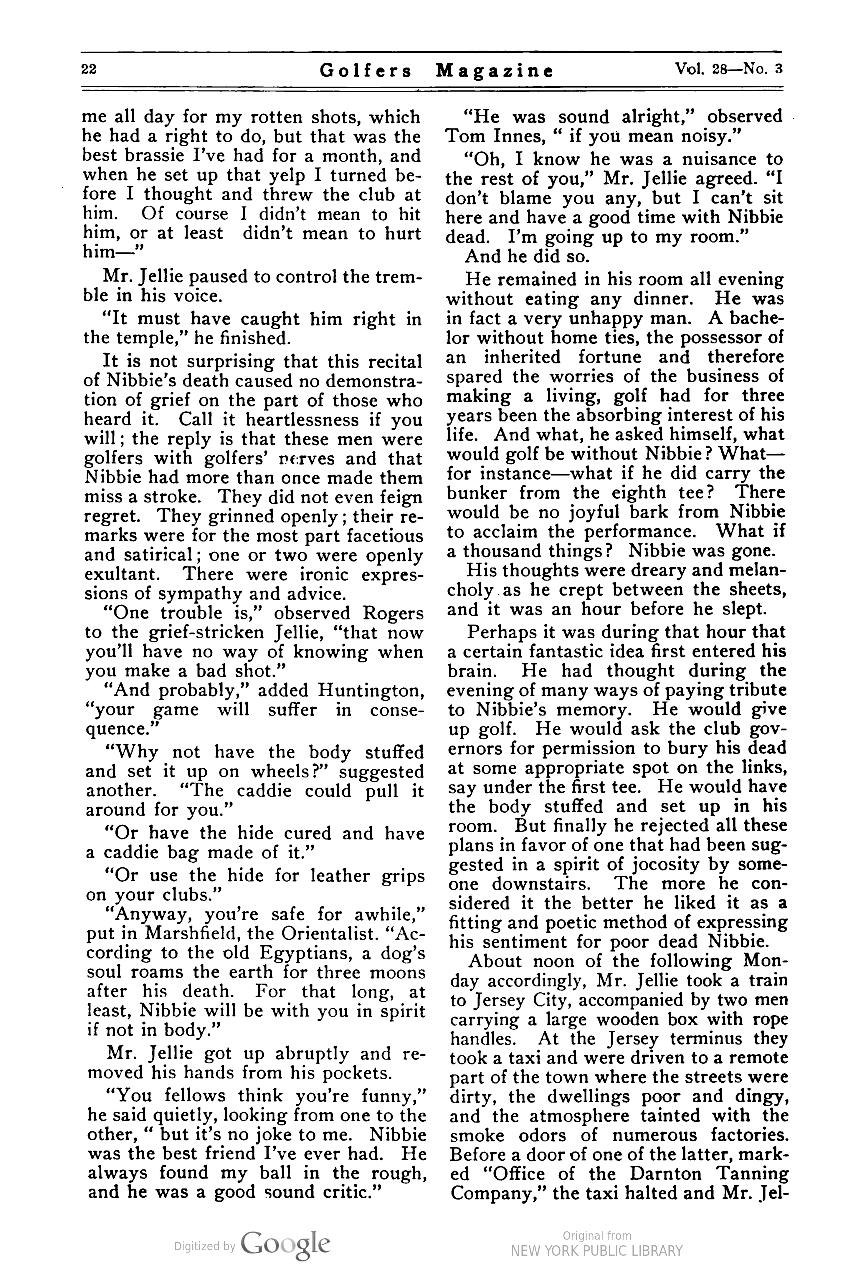me all day for my rotten shots, which he had a right to do, but that was the best brassie I’ve had for a month, and when he set up that yelp I turned before I thought and threw the club at him. Of course I didn’t mean to hit him, or at least didn’t mean to hurt him—”
Mr. Jellie paused to control the tremble in his voice.
“It must have caught him right in the temple,” he finished.
It is not surprising that this recital of Nibbie’s death caused no demonstration of grief on the part of those who heard it. Call it heartlessness if you will; the reply is that these men were golfers with golfers’ nerves and that Nibbie had more than once made them miss a stroke. They did not even feign regret. They grinned openly; their remarks were for the most part facetious and satirical; one or two were openly exultant. There were ironic expressions of sympathy and advice.
“One trouble is,” observed Rogers to the grief-stricken Jellie, “that now you'll have no way of knowing when you make a bad shot.”
“And probably,” added Huntington, “your game will suffer in consequence.”
“Why not have the body stuffed and set it up on wheels?” suggested another. “The caddie could pull it around for you.”
“Or have the hide cured and have a caddie bag made of it.”
“Or use the hide for leather grips on your clubs.”
“Anyway, you're safe for awhile,” put in Marshfield, the Orientalist. “According to the old Egyptians, a dog’s soul roams the earth for three moons after his death. For that long, at least, Nibbie will be with you in spirit if not in body.”
Mr. Jellie got up abruptly and removed his hands from his pockets.
“You fellows think you’re funny,” he said quietly, looking from one to the other, “but it’s no joke to me. Nibbie was the best friend I’ve ever had. He always found my ball in the rough, and he was a good sound critic.”
“He was sound alright,” observed Tom Innes, “if you mean noisy.”
“Oh, I know he was a nuisance to the rest of you,” Mr. Jellie agreed. “I don’t blame you any, but I can’t sit here and have a good time with Nibbie dead. I’m going up to my room.”
And he did so.
He remained in his room all evening without eating any dinner. He was in fact a very unhappy man. A bachelor without home ties, the possessor of an inherited fortune and therefore spared the worries of the business of making a living, golf had for three years been the absorbing interest of his life. And what, he asked himself, what would golf be without Nibbie? What—for instance—what if he did carry the bunker from the eighth tee? There would be no joyful bark from Nibbie to acclaim the performance. What if a thousand things? Nibbie was gone.
His thoughts were dreary and melancholy as he crept between the sheets, and it was an hour before he slept.
Perhaps it was during that hour that a certain fantastic idea first entered his brain. He had thought during the evening of many ways of paying tribute to Nibbie’s memory. He would give up golf. He would ask the club governors for permission to bury his dead at some appropriate spot on the links, say under the first tee. He would have the body stuffed and set up in his room. But finally he rejected all these plans in favor of one that had been suggested in a spirit of jocosity by someone downstairs. The more he considered it the better he liked it as a fitting and poetic method of expressing his sentiment for poor dead Nibbie.
About noon of the following Monday accordingly, Mr. Jellie took a train to Jersey City, accompanied by two men carrying a large wooden box with rope handles. At the Jersey terminus they took a taxi and were driven to a remote part of the town where the streets were dirty, the dwellings poor and dingy, and the atmosphere tainted with the smoke odors of numerous factories. Before a door of one of the latter, marked “Office of the Darnton Tanning Company,” the taxi halted and Mr. Jel-
